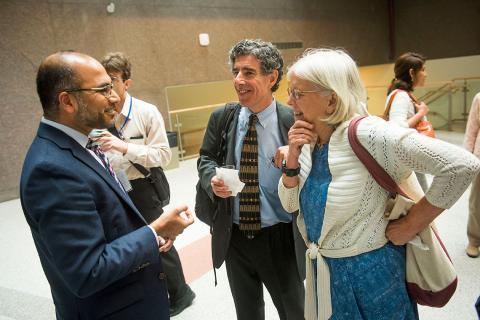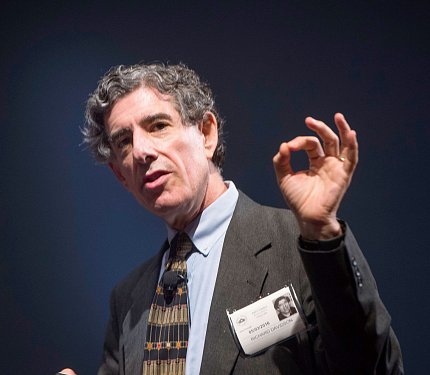readying for Slings, Arrows
Davidson Lectures on Benefits of Meditation

Photo: Lisa Helfert
We undergo many kinds of training in life—career, physical fitness, sports, artistic pursuits. Dr. Richard Davidson asks, why not consider training in a life skill that, the evidence suggests, could benefit our health and well-being, and in turn our wider communities and the world?
Davidson, an NCCIH grantee and an internationally known researcher on meditation and other contemplative practices, reported findings from his laboratory at the 2016 Stephen E. Straus Distinguished Lecture in the Science of Complementary Therapies, “Change Your Brain by Transforming Your Mind.” At the University of Wisconsin, he is the William James and Vilas professor of psychology and psychiatry, director of the Waisman Laboratory for Brain Imaging and Behavior and founder of the Center for Healthy Minds. NCCIH’s annual lecture honors Straus, its founding director.
While most meditation practices originated in ancient religious and spiritual traditions, Davidson said, the reasons that people use them today have often changed: “People feel like they’re overwhelmed and very stressed. They may have chronic pain. [They want] to quiet the soul, produce some modicum of equanimity. They may feel like their lives are not working and want some kind of other strategy to help them cope with life’s slings and arrows.”
Davidson recalled that in 1992, he was a faculty neuroscientist at Wisconsin and had established the university’s first lab on emotion and the brain when he had a career- and life-changing encounter: he met the 14th Dalai Lama of Tibet; the two remain friends and colleagues to this day.
The Dalai Lama challenged Davidson, asking, “Why have you been using the tools of modern neuroscience just to study anxiety, stress, fear and depression? Why can’t you use them to study kindness and compassion?” That question, Davidson said, was “a total wake-up call” and caused him to refocus his research, to do everything he could “to help place these positive qualities on the scientific map.”

Photo: Lisa Helfert
In his lecture, Davidson identified “four constituents of well-being” that have been neuroscientifically investigated, have shown plasticity (i.e., they can change) and appear to be affected by meditation training. The first is resilience, “the reactivity and rapidity of recovery following negative events.” The second is positive outlook, “the capacity to savor positive emotion and have it endure.” The third is the ability to focus and sustain attention, which is the opposite of “mind wandering,” and the fourth is generosity: “There’s now a growing neuroscientific literature suggesting that acts of generosity promote well-being and activate the circuitry in the brain that has been associated with well-being.”
In one pioneering study, Davidson and the Dalai Lama recruited a group of monks and other long-term practitioners in the Tibetan Buddhist tradition from India and Nepal who had practiced compassion meditation for thousands of hours. They were flown to Davidson’s lab in Wisconsin and studied, both in meditation and resting states, with scalp electroencephalography (EEG), and later fMRI. EEG showed, in meditation only, sustained, high-amplitude gamma oscillations and phase-synchrony in their brains—phenomena not seen in controls (people who had just learned meditation a week before). These oscillations could be induced and increased by meditation, Davidson’s team concluded, and are a key marker of the brain’s ability to undergo short-term and long-term changes.

Photo: Lisa Helfert
Another study, in healthy adults, found that 8 weeks of training in mindfulness-based stress reduction appeared to have positive effects on immune function (seen as higher levels of antibody to a flu vaccine) and to have measurable brain effects. A third study found that, after viewing pictures of human suffering, the brains of long-term meditators recovered better than those of participants who were new to meditation or were non-meditators.
It’s not necessary to become a monk, or even practice meditation for a long time, to see benefits, Davidson said. For example, his team recruited a group of healthy college students who were instructed to recite a compassion meditation silently for 2 weeks, 30 minutes per day—“May you be free from suffering. May you have joy and ease.” Every time they did this, they were to think of a series of people—first a loved one, then themselves, then someone they saw regularly but didn’t know well, a “difficult” person and finally all beings. The control group was assigned cognitive reappraisal (a technique for interpreting upsetting stimuli differently). Participants were randomly assigned to either group.
When tested in an economic game involving redistribution of funds, the meditation group showed more altruistic behavior than the controls and, via fMRI, showed more changes in brain activity when viewing images of suffering.
The evidence also shows other benefits from meditation, Davidson said, such as regulation of emotion, better-focused attention, more “pro-social” skills like empathy, help in managing pain and changes in peripheral biology (biology below the neck)—e.g., down-regulation of genes implicated in inflammation. He also discussed methodology in meditation research, including the importance of rigor, use of adequate comparison groups and employing behavioral measures when appropriate rather than self-reporting alone.
If people pursue this kind of mental training, more happiness and an inner transformation are entirely possible, Davidson said, thanks to the adaptability of our brains.
The lecture is available at https://videocast.nih.gov/Summary.asp?Live=18700&bhcp=1.
